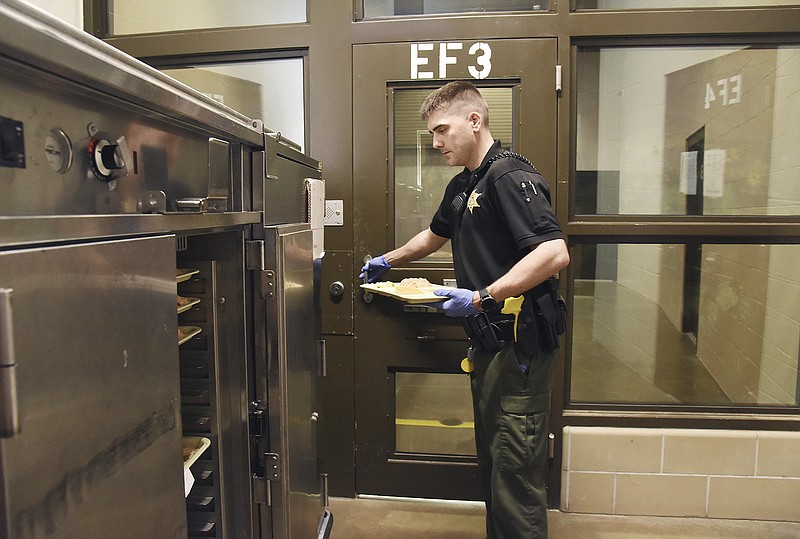People charged with a crime usually are taken to the county jail after their arrest, then released from jail if they can post a bond ordered by the judge.
But, some have complained the bond itself is unfair - because people who can't pay the bond or the bondsman must stay in jail until their trial, which may be many months down the road.
Jefferson City lawyer Rod Chapel sometimes works as a defense attorney, and also is president of the Jefferson City and statewide NAACP organizations.
He's represented at least two people who had to stay in jail because they couldn't pay the bond that was set.
"One (in Cole County) was arrested on some petty charge - I think it was possession of marijuana," Chapel said. "The bond was under $500, as I recall, to get out. Instead of getting out and going (back) to work and keeping his apartment and his car, he lost it all.
"He stayed in jail for six months."
The other client whose story Chapel told lived in the Wentzville area and was arrested for a probation violation.
"He only stayed in jail two or three months," Chapel recalled, "but he pled guilty so he could get out."
To protect their privacy, Chapel declined to identify the two clients by name.
Defense attorney J.R. Hobbs, of Kansas City, served as one of three co-chairs on a Supreme Court-appointed committee that looked at the pretrial release issue.
After teenager Michael Brown was killed by Ferguson Police officer Darren Wilson, complaints started surfacing about the way a number of municipal courts - especially in the St. Louis area - were handling pretrial releases or detention.
"The genesis of this task force goes back to at least the (2014) Ferguson issues and then - echoed by further events including litigation throughout the country - (about having) pretrial release, or bail bonds as it's often referred to, tied solely to a money-bonds system that is viewed as not fair from a variety of points of view."
In his own practice, Hobbs said he's had clients who couldn't afford to post a bond, "so, they (were) basically incarcerated until their case was resolved."
Hobbs said some of the defendants who have had to stay in jail feel a "lot of pressure to plead guilty," and that's not what the legal system is supposed to be about.
As Chapel noted: "They haven't been convicted, yet. These are people who are just looking for due process and a determination about whether they actually did what they were accused of doing."
Retired Cole County Sheriff Greg White told the News Tribune last week: "We have had people held for significant periods of time before trial with bonds they couldn't afford. (But) I believe this has been remediated" locally.
He didn't name any specific cases.
As state Supreme Court Chief Justice Zel Fischer noted Jan. 30 during his State of the Judiciary address: "Though presumed innocent," those who aren't released from jail because they can't post a bond can "lose their jobs, cannot support their families and are more likely to re-offend."
So the Supreme Court wrote new rules in December that go into effect July 1 and tell the state's courts their pretrial release decisions must begin with non-monetary conditions of release, and the courts may impose monetary conditions, such as a bond, only when necessary and only in an amount needed to ensure the defendant's appearance in court or the public's safety.
Part of the new rules says: "When considering the least restrictive condition, or combination of conditions, of release to set and impose, the court shall first consider non-monetary conditions."
If the court determines that some monetary charge - such as a bond - is needed to guarantee the defendant's appearance in court, the new rule says the judge cannot impose "a monetary condition fixed at more than is necessary to secure the appearance of the defendant at trial, or at any other stage of the criminal proceedings, or the safety of the community or other person, including but not limited to the crime victims and witnesses."
Cole County Sheriff John Wheeler told the News Tribune last week: "I don't have a problem with non-monetary bonds as long as the individual is vetted well enough to ensure the safety of the public.
"Since both types of pretrial release (bonds and non-monetary) are run through the court system, I believe it ensures that there is flexibility for whatever the judges want to do."
Chapel said people need to remember a required bond may be "your rent, or your car payment, or your child support. People are literally trying to balance their daily needs against the bond they would have to try to require.
"That's not fair, and to be truthful, that's not necessary."
But, Chapel added: "I love that we as a society are having this discussion in terms of reforming the criminal justice system that in Missouri many believe is not functioning as well as it should be.
"I think it's important that we look at the reforms and make sure that they all have substance and are applied fairly for every Missourian."
White served nearly 12 years as Cole County's sheriff before being succeeded by Wheeler.
White said: "The only bond mandate is that it be reasonable for the individual defendant, helping to insure court appearances. Judges have always had the option available of setting bond and, under certain circumstances, denying bond. The standard is insuring court appearances."

